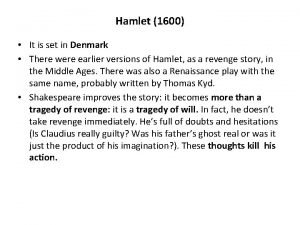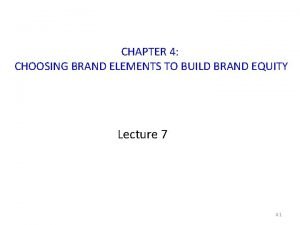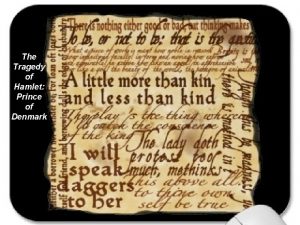THE TRAGEDY OF HAMLET INTRODUCTION Written around 1600















- Slides: 15

THE TRAGEDY OF HAMLET

INTRODUCTION �Written around 1600 �One of the most problematic texts in all of literature

THE TRAGEDY � A tragedy is a story of exceptional calamity leading to the death of a man in high estate A. C. BRADLEY � Shakespeare's plays usually classified as 'tragedies' are: Titus Andronicus (1592) Romeo and Juliet (1592) Julius Caesar (1599) Hamlet (1600 -01) Othello (1603) King Lear (1605 -06) Timon of Athens (1605) Macbeth (1606) Antony and Cleopatra (1606) Coriolanus (1608)

COMEDY VS. TRAGEDY �COMEDY: � The characters tend to be ordinary people, rather than kings and queens The emotions and dangers are comparatively mild The outcome of the action is happy - the plays generally end in marriage The main thrust of the action is from chaos to resolution

COMEDY VS. TRAGEDY CONT’D �TRAGEDY: � The characters are of very high social standing (kings, princes, generals) The dangers are extreme The conclusion is sad The action moves towards a state of chaos

THE HERO � All of Shakespeare's tragedies have a tragic hero, or 'protagonist' who is put into a situation of conflict which he must resolve. A combination of bad luck and misjudgement lead to the hero's death. He is often a man of high social standing: Lear and Macbeth are kings Hamlet and Othello are princes - Othello is also a military general Julius Caesar and Antony are rulers of Romeo is a wealthy citizen

THE NATURE OF TRAGEDY �Tragedies are tales of harshness and injustice. They chart the downfall of a hero, whose own death leads to the downfall of others: � Ophelia, Laertes, Polonius, Gertrude, Claudius, Rosencrantz and Guildenstern also die THE FATAL FLAW Procrastination

CATHARSIS �When the audience can finally breathe a sigh of relief. � Warring prince from Norway comes upon the scene of death, hears the tragic story of Hamlet's life, and decides to treat Hamlet's body like that of a hero � Sad, but provides closure

REVENGE PLAY �No authorities to appeal to � either because the original criminal is too powerful (e. g. , has become king) or those in a position to act do not know about or believe in the criminality of the original villain �Victim (Hamlet Senior) �Villain (Claudius) �Avenger (Hamlet) � The key question: Why does Hamlet wait so long?

WHY THE DELAY? �Some ignore the problem � Dover Wilson: does it when he can � E. E. Stoll: delay is convention – no play without the delay �Timeline is unknown �Fortinbras and Laertes act immediately � Hamlet’s situation does not permit this

INTERNAL CONDITION �Hamlet is a coward � BUT: He’s capable of very decisive action when necessary (as in the killing of Polonius, the confrontation with the ghost, or the duel scene) �Physical problem � BUT: Doesn’t help analytically

HAMLET IS TOO GOOD FOR THIS WORLD (GOETHE) � Shakespeare meant. . . to represent the effects of great action laid upon a soul unfit for the performance of it. . A lovely, pure, noble and most moral nature, without the strength of nerve which forms a hero, sinks beneath a burden which it cannot bear and must not cast away. All duties are too holy for him; the present is too hard. Impossibilities have been required of him; not in themselves impossibilities, but such for him. He winds and turns, and torments himself; he advances and recoils; is ever put in mind, ever puts himself in mind; at last does all but lose his purpose from his thoughts; yet still without recovering his peace of mind.

THE WORLD IS TOO BRUTAL (NIETZSCHE) � In this sense the Dionysian man has similarities to Hamlet: both have had a real glimpse into the essence of things. They have understood, and it disgusts them to act, for their action can change nothing in the eternal nature of things. They perceive as ridiculous or humiliating the fact that they are expected to set right again a world which is out of joint. The knowledge kills action, for action requires a state of being in which we are covered with the veil of illusion—that is what Hamlet has to teach us, not that really venal wisdom about John-a-Dreams, who cannot move himself to act because of too much reflection, because of an excess of possibilities, so to speak. It’s not a case of reflection. No!—the true knowledge, the glimpse into the cruel truth overcomes every driving motive to act, both in Hamlet as well as in the Dionysian man. Now no consolation has any effect any more. His longing goes out over a world, even beyond the gods themselves, toward death. Existence is denied, together with its blazing reflection in the gods or in an immortal afterlife. In the consciousness of once having glimpsed the truth, the man now sees everywhere only the horror or absurdity of being; now he understands the symbolism in the fate of Ophelia; now he recognizes the wisdom of the forest god Silenus. It disgusts him.

MOST POPULAR EXPLANATION: �Is the ghost from heaven or hell? � He must confirm the validity of the ghost’s information and his mission, and his delay is therefore a necessary part of the revenge plan � Even after he has confirmed the truth of the ghost with the play within the play he does not carry out the murder, although immediately after the play and the confirmation of the ghost’s story he has a supreme opportunity to do so

OR IS IT AN OEDIPUS COMPLEX? �He is incapable of killing the man who sleeps with his mother because that would mean that he would have to admit to himself his own feelings about her, something which overwhelms him and disgusts him �Hamlet can kill Claudius only after he knows that his mother is dead and that he is going to die. Hence, his deep sexual confusion is resolved; only then can he act �By killing Claudius he would make his mother available and be attacking the ideal nobility of his real father
 Frailty thy name is woman
Frailty thy name is woman Hamlet 1600
Hamlet 1600 Father of tragedy
Father of tragedy Characteristics of a tragedy
Characteristics of a tragedy Shakespearean drama characteristics
Shakespearean drama characteristics كما تدين تدان english
كما تدين تدان english Goes around comes around meaning
Goes around comes around meaning Characters of hamlet
Characters of hamlet Elizabethan drama the tragedy of hamlet unit test
Elizabethan drama the tragedy of hamlet unit test The tragedy of hamlet unit test
The tragedy of hamlet unit test The tragedy of hamlet prince of denmark
The tragedy of hamlet prince of denmark Likability as a brand element include
Likability as a brand element include Jingles are musical messages written around the brand.
Jingles are musical messages written around the brand. Jingles are the message written around the brand
Jingles are the message written around the brand William shakespeare 1601
William shakespeare 1601 Hamlet was written by william shakespeare
Hamlet was written by william shakespeare




























